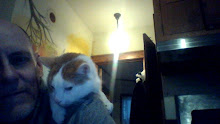Prose Abandoned at Some Point I Do Not Remember
On
Nothing and the Non-Political: a Satirical Amusement in Associative Criticism
I would like
to say that I have nothing to say but Mr. J. Cage (Pomona Collage, DNF) in his Harvard lecture of 1964,
has already done that. He went there on that occasion, on that day in that month of that year, to say nothing and that is precisely what he said, that nothing. Or he went there to say the something he did say about the nothing that he wanted to say but was said anyway by its not being said. One wonders. Everything
is political, even the non-political. Which is to say that being political is
one of the most ideologically freighted ways of being non-political. The
distinction between the political and the non-political has yet to be
established, though it should be as there must surely be things which are non-political: an
apple, a shoelace a shaft of sunlight with dust twirling, to suggest some few candidates. However, if they are political - that is, they are not non-political - then where should we place them on the political spectrum. And what
of the spectrum itself: that too must be political and if it is where would the
spectrum place itself, politically speaking, on the spectrum. (It has long been a suspicion that for the left all is political, whereas for the right nothing is political other than the left's insisting all is political even the non-political.)
There is a branch of contemporary philosophical thought – or should I say ‘philosophical
textuality’ – that posits the impossibility of thought beyond language
understood in its most basic sense. We’ll not visit that understanding here because
if we did we would surely find ourselves far from the subject of this lecture.
Which has, I concede, not been sketched yet in a compelling or meaningful way
but has been presented as something sensed, something about which most thinking
people would already have encountered in the nature of an ‘inkling’ – that is,
something made by an anecdotal awareness. Thought then, and language then,
and the political then, and the nothing from which the political adheres as a
necessary condition of textuality that contradicts its very possibility. The possible
is just that: it is that which holds hands with the impossible. We shall not
come back to this point; however, we shall refer to it when need requires we do
so. Philosophy begs certain silences as a means to allow the moving forwards or
backwards, however it moves: one image that seems useful is that of a spinning cup
in which people are set and strapped and disoriented for various purposes: one
of which is a crude sensory delight. Not all find such delightful, but many do.
I do not. Age does things to the inner ear.
The political
again, and the non-political. But what of the not-political: nature surely in
its actions can be said at least to provide a confirmation of the famous
Freudian flexibility: a cigar and nothing more than a cigar. People are political but it is always another
who sees the political there and such seeing is as if in advance of a strict judgement
coming, a florid and cruel condemnation.
The non-political as distinct from the not-political: is this a worthwhile distinction to worry about. Health care is a worry, but that distinction – non or not – well, it hardly seems to matter for some. I would suggest, as a start, that the matter be viewed merely as an assumption that guides the game of language in the direction of a certain textuality. Marx and Engel’s in the Communist Manifesto – an agitated political textuality, no matter one’s own political inhibitions – has in it a lyrical yearning after an end to certain sorrows – poverty, gross inequalities in the distribution of wealth, unfairness in the possibilities presented to those who work without shoes and those who have closets full of shoes
And bells ring from the white clapboard church
High on
the bare hill shaped like a covenant stone
And voices
ring from out of the fog
And
thunder rolls its great cart out of the East
And wild coats soar
And the cost of an orange made impossible
And the
young man yearns to hold the hand of the young woman
And the
helicopter readies its guns
And swift
boats their small canon
And the
cemetery awaits the political and non-political alike
And no
one cares about the not-political
And one age is the invention of another
And huts beckon as we near
I would
say that I have nothing to say, the venerable Mr. J. Cage once said, in a lecture
delivered at Harvard in 1964 – in truth, I have no idea what school Cage delivered
his lecture (was it a lecture?) nor the year. I have attempted to say nothing
too but have failed because in saying certain empty things I might very well
have said one or two things of substance. Forgiveness, dear reader, is sought, kindness wrought.
FIN

